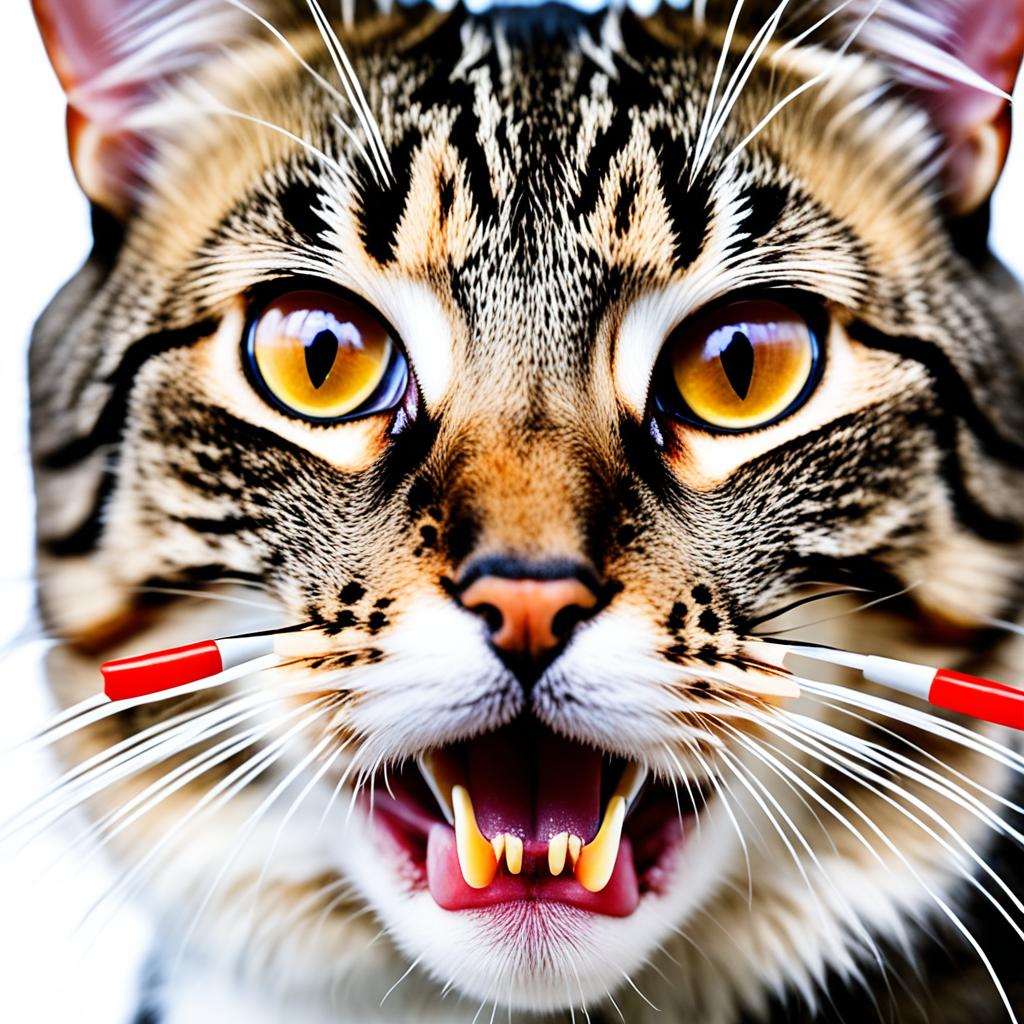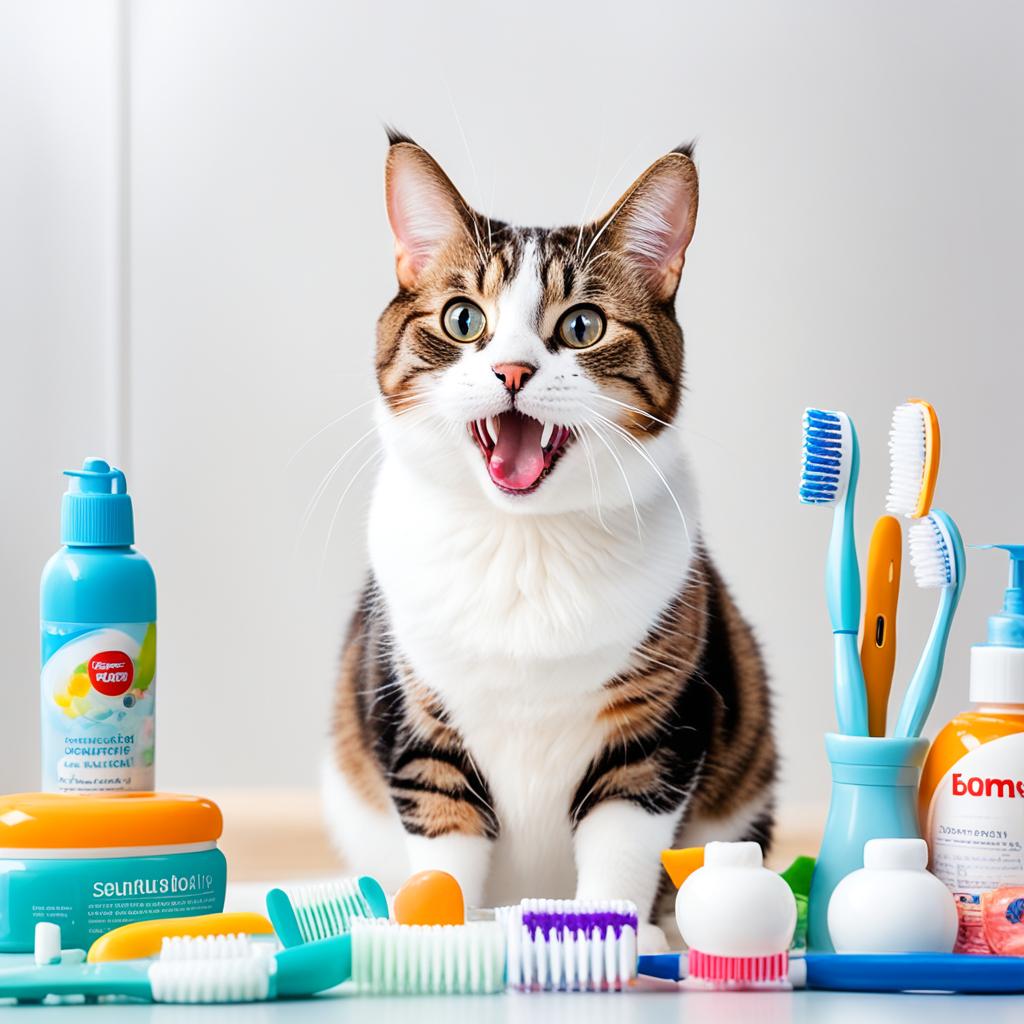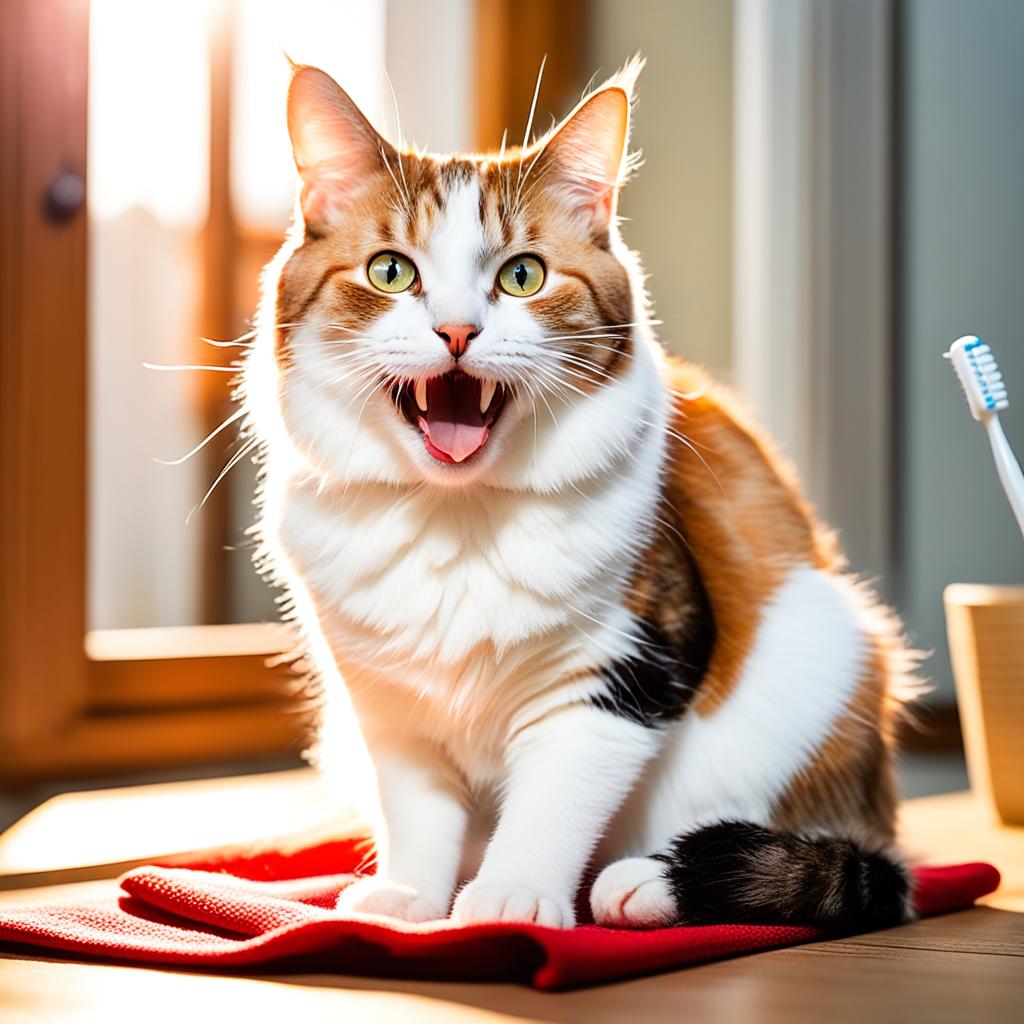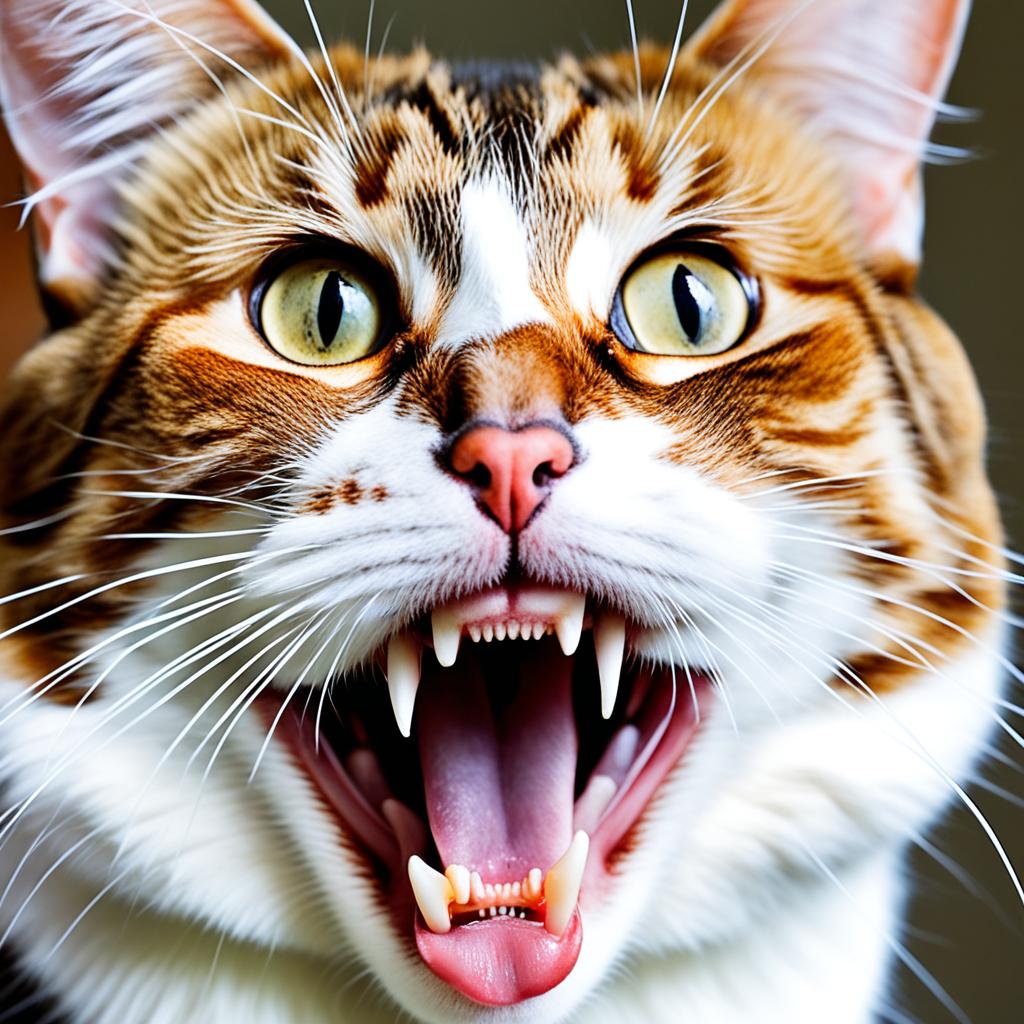Did you know that your Japanese Bobtail cat’s bad breath could be a sign of something more serious than just a poor olfactory experience? Yes, freshening your cat’s breath isn’t just about keeping things pleasant for your nose—it’s also a crucial aspect of their overall health. Implementing effective dental care for Japanese Bobtail cats is essential in ensuring their mouths stay fresh and healthy.
By focusing on proper dental care practices and using the right products, you can significantly improve your cat’s breath odor and help avoid potential health issues. Dive into our essential tips for freshening your cat’s breath and ensuring their long-term well-being.
Key Takeaways
- Bad breath in cats can indicate underlying health issues.
- Regular dental care is crucial for Japanese Bobtail cats.
- Effective breath-freshening products can aid in maintaining oral health.
- Identifying and addressing the root causes of bad breath is essential.
- Consistency in dental care routines promotes overall health and well-being.
Understanding the Causes of Bad Breath in Japanese Bobtail Cats

Ever wondered what might be lurking behind your feline friend’s foul breath? Identifying the causes of bad breath in cats, specifically your charming Japanese Bobtail, is essential for both their comfort and feline oral health.
Primarily, poor dental hygiene is a major culprit. Imagine if you skipped brushing your teeth for weeks—yikes! Plaque and tartar buildup in Japanese Bobtails can lead to gingivitis and even periodontal disease, both significant Japanese Bobtail health concerns.
Your Bobtail’s diet can be another sneaky offender. Certain cat foods might contribute to lingering odors. On a more serious note, bad breath can sometimes signal underlying medical issues like kidney disease or diabetes, which require immediate attention. To ensure comprehensive feline oral health, it’s critical to address these potential problems.
Here’s a quick comparative look at common causes of bad breath and their impacts:
| Cause | Impact |
|---|---|
| Poor Dental Hygiene | Leads to plaque buildup and gum disease |
| Diet | May exacerbate bad breath |
| Medical Conditions | Indicates potential systemic health issues |
The good news? By recognizing these Japanese Bobtail health concerns, you can take proactive steps to ensure your kitty’s breath is as fresh as a daisy (or as close as possible!). Stay tuned for tips on managing and treating bad breath in upcoming sections.
How to Deal with a Japanese Bobtail Cat’s Bad Breath?

Dealing with a Japanese Bobtail cat’s bad breath might seem daunting, but addressing it involves understanding a few key factors and implementing effective strategies. By focusing on identifying common triggers and maintaining rigorous oral hygiene practices, you can ensure your furry friend’s breath is always fresh.
Common Triggers
The road to combating bad breath starts with recognizing common triggers. Poor diet, leftover food particles, or dental conditions such as tartar buildup are often culprits. Being mindful of what your cat eats and ensuring you feed them a balanced diet can significantly reduce malodors. It’s also crucial to identify dental issues early on as they play a pivotal role in affecting breath quality.
Importance of Oral Hygiene
Maintaining proper oral hygiene is paramount in preventing dental disease in cats. Regular brushing using a cat toothbrush and feline-friendly toothpaste can help in removing plaque and preventing tartar from forming. Additionally, incorporating effective cat oral hygiene practices such as dental treats or water additives can further aid in keeping your Japanese Bobtail’s breath fresh.
Investing time in your cat’s daily dental routine not only keeps their breath in check but also prevents severe dental diseases, ensuring their overall well-being. Here are a few recommendations to help you in your quest:
- Brush your cat’s teeth at least three times a week.
- Use high-quality cat-specific toothpaste and brushes.
- Incorporate dental rinses or water additives.
- Provide dental treats that promote oral health.
By understanding How to Deal with a Japanese Bobtail Cat’s Bad Breath through recognizing triggers and committing to cat oral hygiene practices, you can effectively combat and prevent dental disease in your beloved pet.
Effective Cat Bad Breath Remedies

Taking care of your cat’s breath might seem like a small chore, but it’s vital for their overall health and well-being. Let’s dive into some top-notch solutions, both natural and commercial, that can banish those stinky odors from your feline friend’s mouth.
Natural Solutions
If you’re inclined towards holistic approaches, you’ll be pleased to know there are several natural remedies for cat bad breath that are both effective and safe. Often, ingredients like plantain, neem, and sage are used for their antibacterial properties. Not only do these plants help combat bad breath, but they also improve overall oral health.
- Plantain: Known for its antimicrobial qualities, plantain can help reduce bacteria in your cat’s mouth.
- Neem: A natural antiseptic, neem works wonders in reducing plaque buildup and freshening breath.
- Sage: Besides being a beloved cooking herb, sage acts as a natural astringent to tighten gums and fight bacteria.
Commercial Products
While natural remedies are great, sometimes you need to bring out the big guns. Commercial dental products for cats are specifically formulated to tackle bad breath and maintain oral health. These products often contain enzymes that break down food particles and reduce odor.
| Product | Benefits |
|---|---|
| Virbac C.E.T. Enzymatic Toothpaste | Contains dual-enzyme system to combat plaque and freshen breath. |
| TropiClean Fresh Breath Water Additive | Easily added to water, it actively works to reduce bad breath and improve dental hygiene. |
| Oxyfresh Premium Pet Dental Care Solution | An odorless, tasteless water additive that fights plaque and tartar. |
Combining natural cat bad breath remedies with reputable commercial products ensures you’re giving your feline the best chance at fresh breath and excellent oral health.
Best Practices for Cat Dental Health

Ensuring the dental health of your Japanese Bobtail can be a rewarding routine with the right tools and habits. By establishing a solid foundation for cat dental care, you can help ward off unpleasant breath and more severe health issues.
Regular Brushing Tips
Brushing Japanese Bobtail cat’s teeth regularly is paramount. Start with a cat-friendly toothbrush and toothpaste specifically designed for felines. Begin brushing when your cat is calm, such as after a meal, ensuring a positive experience. Introduce the process slowly, allowing your pet to get used to the sensation.
Consistency is key; aim for at least two to three times a week to reduce plaque and tartar buildup. Pair this routine with gentle praise and treats to reinforce good behavior.
Using Dental Treats
Integrating dental treats for cats into your Japanese Bobtail’s diet can augment your brushing efforts. Dental treats are designed to scrub away plaque and freshen breath as your cat chews. Look for treats that have received the Veterinary Oral Health Council (VOHC) seal of approval.
| Brand | Main Benefit | Flavor Options |
|---|---|---|
| Greenies Feline Dental Treats | Reduces tartar buildup | Chicken, Salmon |
| Feline Greenies Dental Treats | Freshens breath | Tuna, Catnip |
| Blue Buffalo Dental Bones | Natural ingredients | Chicken, Fish |
Combining regular brushing Japanese Bobtail cat’s teeth with the use of dental treats for cats ensures a comprehensive approach to maintaining optimal dental health. Incorporating these best practices for cat dental health can significantly contribute to your furry friend’s overall well-being.
Preventing Bad Breath in Japanese Bobtail Cats

Proactive efforts are key to preventing bad breath in Japanese Bobtail cats. Ensuring their diet supports dental health, providing them with appropriate chew toys, and establishing routine dental check-ups can help keep those kitty kisses fresh.
- Dental-Friendly Diet: Opt for foods specially formulated to reduce plaque and tartar buildup, as these can significantly aid in preventing bad breath in Japanese Bobtail cats.
- Chew Toys: Invest in chew toys designed to clean your cat’s teeth. These not only entertain your furry friend but also promote preventative oral care for cats.
- Regular Check-ups: Schedule periodic dental check-ups with your veterinarian to catch any potential oral health issues early on.
Additionally, maintaining a consistent cleaning routine at home contributes substantially to preventative oral care for cats. By combining these strategies, you can ensure your Japanese Bobtail cat enjoys a life free of bad breath and full of healthy, happy purrs.
| Preventative Measure | Benefit |
|---|---|
| Special Diet | Reduces plaque and tartar buildup |
| Chew Toys | Promotes teeth cleaning |
| Routine Check-ups | Early detection of oral issues |
Japanese Bobtail Cat Oral Hygiene Routine

Maintaining a comprehensive oral hygiene routine is vital for your Japanese Bobtail cat’s health. Regular daily care, paired with monthly veterinary check-ups, can prevent dental diseases and ensure fresh breath.
Daily Dental Care
Daily dental care for cats involves brushing their teeth with specialized cat toothpaste to remove plaque and prevent tartar buildup. Additionally, incorporating dental treats and toys designed to promote oral health can make a significant difference. Using mouth drops and sprays formulated for feline dental care can also help in maintaining your Japanese Bobtail cat’s oral hygiene.
Monthly Check-ups
Routine veterinary dental check-ups are crucial for detecting any dental issues early and addressing them promptly. During these visits, your vet will thoroughly examine your cat’s teeth and gums, perform professional cleanings if necessary, and provide personalized advice on maintaining your Japanese Bobtail cat’s oral hygiene at home.
- Brush your cat’s teeth daily.
- Use dental treats and toys.
- Incorporate mouth drops and sprays.
- Schedule monthly veterinary check-ups.
By following these steps, you can ensure optimal oral health and fresh breath for your beloved Japanese Bobtail cat.
Treating Halitosis in Cats: What to Know

Are you tired of cringing every time your feline friend tries to snuggle up a little too close? Treating halitosis in cats is essential, not only to save your nostrils but also to ensure your pet’s overall health. Here’s how you can address that persistent bad breath:
Veterinary Consultations
First things first, schedule a veterinary dental examination. Your vet can pinpoint the root cause of your cat’s foul breath. Whether it’s a dental issue, a digestive problem, or something more serious, a professional consultation is crucial. Regular check-ups help in catching and treating halitosis in cats early, avoiding more complex health concerns.
Using Mouth Drops
Once you’ve ruled out or treated any medical concerns, consider using mouth drops for cats. These products can be a game-changer. Specialized mouth drops not only freshen breath but also contain ingredients that promote dental health. They’re easy to use, simply add them to your cat’s water or apply directly into their mouth.
Regular veterinary dental examinations paired with effective mouth drops for cats can make a significant difference. Consistent follow-ups will ensure any new or persisting issues are promptly addressed. Stay proactive, and your feline friend will not only be healthier but much more pleasant to cuddle!
Dealing with Other Japanese Bobtail Cat Dental Issues

When it comes to your Japanese Bobtail, dental issues might extend beyond just bad breath. Being aware of potential symptoms and understanding effective treatments is crucial for keeping your feline friend in prime health.
Identifying Symptoms
Recognizing early signs of dental problems can make all the difference. Watch out for:
- Bad breath that doesn’t improve despite regular brushing
- Excessive drooling
- Difficulty eating or reduced appetite
- Red or swollen gums
- Visible tartar buildup on teeth
Identifying cat dental problems early can lead to more effective treatments and less discomfort for your cat.
Solutions and Treatments
Once you’ve identified potential Japanese Bobtail cat dental issues, it’s time to explore solutions. Here’s a handy table for quick reference:
| Issue | Solution | Remarks |
|---|---|---|
| Gum Disease | Professional Dental Cleaning | Regular check-ups are crucial |
| Tooth Decay | Tooth Extraction | Monitor for any signs of pain |
| Tartar Buildup | Specialized Oral Care Sprays | Daily use for best results |
A combination of home remedies and professional dental treatments for cats ensures that your Japanese Bobtail maintains optimal oral health. Don’t forget to consult with your veterinarian for personalized advice tailored to your furry friend’s needs.
Conclusion
Ensuring top-notch oral hygiene for your Japanese Bobtail cat is not just a luxury, but a vital part of their overall health routine. By integrating holistic oral care for cats and leveraging various oral hygiene solutions for cats, you can significantly improve their dental health. Regular brushing, combined with the use of dental treats, can make a world of difference.
Being proactive by understanding the causes of bad breath and implementing preventative measures is key in feline dental health maintenance. Remember, daily care, combined with monthly veterinary check-ups, will help detect any issues early on, ensuring that your furry friend enjoys a lifetime of fresh breath and robust health.
Embrace the wealth of natural and commercial products available to keep your cat’s breath fresh. Wielding the best practices and staying informed about effective remedies will put you on the right path. With dedication to their oral care, your Japanese Bobtail cat will show off not only their iconic bobtail but also a dazzlingly healthy smile!
FAQ
Why does my Japanese Bobtail cat have bad breath?
Bad breath in Japanese Bobtail cats can result from various issues such as poor dental hygiene, diet, or more severe medical conditions. Identifying the root cause is crucial for effective treatment.
What are effective cat bad breath remedies?
Remedies include natural solutions with ingredients like plantain, neem, and sage, as well as commercial products such as dental treats and vet-recommended mouth drops.
How can I improve my Japanese Bobtail cat’s breath odor?
Regular brushing, using dental treats, and ensuring a balanced diet are key practices. Incorporating holistic remedies and commercial products can also help.
What are some common causes of bad breath in Japanese Bobtail cats?
Common causes include dental diseases, poor diet, and underlying health conditions. Regular check-ups can help pinpoint and address these issues.
What should a daily dental care routine for a Japanese Bobtail cat include?
A daily routine should include brushing their teeth with cat-specific toothpaste, using dental wipes, and possibly mouth drops to maintain oral hygiene.
How often should I take my Japanese Bobtail cat for dental check-ups?
Monthly veterinary dental check-ups are recommended to detect and address any oral health issues promptly, ensuring long-term dental health.
What are the best practices for cat dental health?
Best practices include regular brushing, providing dental treats, maintaining a nutritious diet, and scheduling routine dental check-ups with your vet.
How can I prevent bad breath in my Japanese Bobtail cat?
Preventing bad breath involves consistent dental care, a healthy diet, appropriate chew toys, and regular dental check-ups to catch any issues early.
What should I do if my cat has persistent halitosis?
Persistent halitosis requires a veterinary consultation to diagnose and treat any underlying issues. Using mouth drops and following the vet’s guidance can help manage the condition.
What are some signs of dental issues in Japanese Bobtail cats?
Signs include bad breath, swollen gums, excessive drooling, and difficulty eating. If you notice any of these symptoms, consult your veterinarian for a diagnosis and treatment plan.




